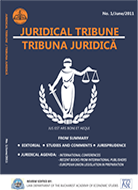Economic and labor rights in the European Union after Lisbon: an institutional approach
Economic and labor rights in the European Union after Lisbon: an institutional approach
Author(s): Konstantinos MargaritisSubject(s): Law, Constitution, Jurisprudence
Published by: Societatea de Stiinte Juridice si Administrative
Keywords: economic freedoms; labor rights; Lisbon Treaty; opt-out protocol.
Summary/Abstract: Economic and labor rights belong to the core of business action, since they constitute the institutional framework for actors involved in business, employers and workers. Since the European integration is progressing, we may speak of a European environment for business, a common market in European legal terms, which became the main aim for the Communities since 1957. At the end of 2009, with the enforcement of the Lisbon Treaty amendments, important changes were brought in the fundamental rights protection in EU, mainly with the enactment of the EU Charter of Fundamental Rights. For a better understanding of the framework of economic and labor rights in EU, the traditional economic freedoms and provisions of the Charter will be examined in this paper in order to draw conclusions on the level of protection of such rights and the modifications that the Lisbon Treaty have brought in EU legal order with reference to economic and labor rights.
Journal: Tribuna Juridică
- Issue Year: 3/2013
- Issue No: 06
- Page Range: 202-218
- Page Count: 17

